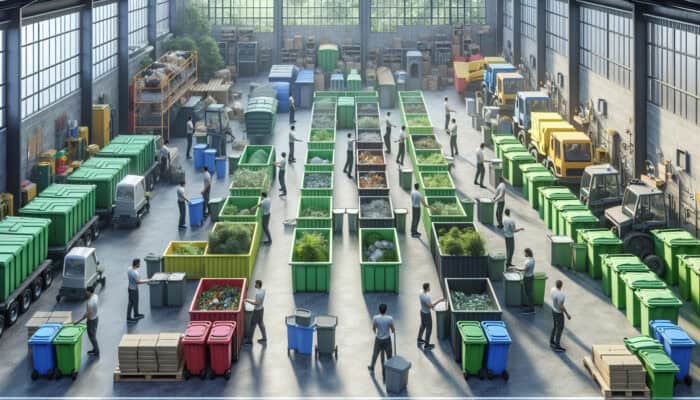Exploring Effective Green Waste Management Strategies Across the UK
Identifying Materials That Fall Under Green Waste Classification

Understanding the nuances of green waste management is essential for anyone looking to contribute positively to environmental sustainability. The term green waste specifically refers to organic materials that primarily result from gardening activities. This includes grass clippings, fallen leaves, branches, and hedge trimmings. It is imperative to be aware of the various classifications of green waste, as this knowledge underpins responsible disposal methods and effective recycling practices. As environmental challenges intensify globally, it becomes increasingly important for residents to engage in waste management practices that align with wider sustainability initiatives.
Seasonal variations significantly influence the types of garden waste produced in the UK, highlighting the importance of being attuned to these changes. For example, autumn often brings a considerable amount of fallen leaves and decomposing plant matter, while springtime typically sees an increase in grass cutting and plant pruning activities. By understanding these seasonal patterns in waste production, homeowners can proactively manage their garden refuse. Properly recognising, categorising, and disposing of these materials through designated recycling channels not only reduces landfill strain but also promotes a healthier, more sustainable environment.
It is also pertinent to acknowledge that certain biodegradable kitchen waste, such as fruit and vegetable peels and cut flowers, may be classified as green waste according to various local council regulations. Being well-informed about local definitions and rules is critical for making educated decisions regarding composting and recycling efforts. This understanding not only ensures compliance with municipal regulations but also collectively advances national recycling objectives, which are essential for tackling more extensive environmental issues.
Steps to Identify Green Waste in Your Household
Recognising green waste within your household is vital for ensuring its proper disposal, which significantly contributes to fostering a sustainable environment. To start, thoroughly inspect both your garden and kitchen to identify materials that qualify as green waste. Common examples include grass cuttings, pruned branches, and various plant trimmings. These organic materials are typically rich in nitrogen and carbon, making them exceptionally suitable for composting.
It is equally important to consider kitchen waste, as items like fruit and vegetable scraps, eggshells, and coffee grounds can also be classified as green waste in many areas. Having a compost bin readily accessible in your kitchen allows you to quickly separate these items, facilitating a more efficient recycling process. This practice not only benefits the environment but also significantly reduces the volume of waste sent to landfills.
When organizing your waste, it is advantageous to allocate a specific area for green waste disposal. Be sure to include materials such as dead plants, weeds, and cut flowers, as they can decompose effectively and replenish nutrients in the soil when properly processed. Actively participating in this identification process simplifies disposal and fosters a more conscientious approach to gardening and food preparation, ultimately benefiting the environment on a larger scale.
The Crucial Role of Responsible Green Waste Disposal
The importance of proper green waste disposal cannot be overstated. Responsible disposal of organic materials significantly reduces the amount of waste directed to landfills, where it can contribute to methane emissions—a potent greenhouse gas. By recycling these materials, we can considerably diminish our carbon footprint and support the health of our ecosystem.
Moreover, responsible disposal practices uphold sustainability by generating compost, which enriches soil health, fosters plant growth, and nurtures biodiversity. When organic matter is composted, it transforms into a nutrient-dense substance suitable for use in gardens and landscapes, effectively completing the waste cycle. This process not only enhances individual gardens but also contributes to broader environmental initiatives aimed at improving soil quality across communities.
From a communal angle, following green waste disposal guidelines helps maintain cleanliness in public spaces, reduces unsightly litter, and cultivates a shared sense of accountability regarding environmental stewardship. Ultimately, adopting responsible disposal practices nurtures a culture of sustainability, inspiring others within the community to embrace similar eco-friendly habits.
Expert Insights on Green Waste Regulations for House Clearance

Highlighting Successful Green Waste Management Case Studies
Real-world examples of effective green waste management practices in the UK showcase various tailored approaches designed to meet the specific needs of diverse communities. Regions across the country have implemented innovative programs that demonstrate the potential of creative solutions for managing green waste. For instance, cities like London have established dedicated collection services specifically for green waste, providing residents with a convenient means of disposing of their garden refuse. This service not only alleviates the burden on households but also enhances recycling efforts throughout the city.
In rural regions such as Yorkshire, community composting schemes have gained traction, where residents work collaboratively to compost their green waste. This initiative fosters community spirit, offers educational workshops on composting techniques, and ultimately improves local soil health. Such grassroots movements serve as exemplary case studies for effectively managing green waste while promoting community engagement.
- Door-to-door green waste collection services in London’s boroughs.
- Community composting initiatives in Yorkshire that encourage collaborative efforts.
- Brighton’s allotments leverage green waste for compost production.
- Scotland’s rural councils are establishing convenient drop-off points for green waste.
Another noteworthy example comes from Wales, where local councils actively involve residents in green waste recycling through educational outreach and incentives. The success of these initiatives illustrates how effective communication and community participation can enhance disposal practices and motivate broader engagement in recycling efforts. By learning from these best practices, households can implement similar strategies tailored to their local context, nurturing a more widespread culture of sustainability.
Best Practices for Disposing of Green Waste Effectively
Adopting best practices for green waste disposal is essential for maximising recycling benefits and mitigating environmental impact. Home composting stands out as one of the most efficient methods, enabling homeowners to convert their green waste into nutrient-rich compost that enhances their gardens’ vitality. A well-maintained compost bin can accommodate a diverse range of organic materials, including kitchen scraps and garden debris, making it a highly effective solution.
Utilising the green bins provided by local councils represents another best practice, simplifying the disposal process. These bins are specifically designed for organic waste, ensuring that your green waste is collected and processed in an environmentally responsible manner. It is advisable to consult with your local authority regarding the specific items accepted in these bins, as regulations can differ by region.
Collaborating with local recycling centres is also an excellent practice. Many centres offer drop-off services for garden waste, allowing residents to dispose of items that might not be accepted in green bins. Engaging with local recycling initiatives not only aids in the effective management of green waste but also contributes to community sustainability goals. Furthermore, this collaboration keeps residents informed about local recycling options and any updates to disposal regulations.
Enhancing Green Waste Management Through House Clearance Services

House clearance companies play a crucial role in the responsible and efficient management of green waste. These companies typically have established systems for sorting and correctly disposing of green waste, alleviating the pressure on homeowners during house clearance projects. By employing a professional service, homeowners can ensure that their garden waste is managed in accordance with local regulations and best practices.
Many house clearance companies provide comprehensive services that encompass the collection of green waste, along with expert guidance on which materials can be disposed of and how to prepare them for collection effectively. Their expertise can streamline the often-daunting process of clearing out one’s home or garden, especially for those unfamiliar with the intricate regulations surrounding green waste disposal.
Additionally, reputable companies are knowledgeable about local recycling centres and can facilitate the delivery of green waste to the appropriate facilities. This not only guarantees that the waste is recycled properly but also minimises the risk of non-compliance with local regulations. Homeowners can rest easy knowing that their green waste is being managed responsibly, contributing to the overarching goal of reducing landfill waste and promoting sustainability.
Understanding the Influence of Local Regulations on Green Waste Management Practices
Local regulations significantly shape the approach to green waste management across the UK. Each council may enforce different rules regarding the collection, disposal, and recycling of green waste, making it essential for residents to familiarize themselves with the specific guidelines applicable to their area. Many councils provide resources detailing what constitutes green waste, along with collection schedules and acceptable disposal methods.
Being aware of these regulations empowers residents to plan their house clearance strategies more effectively. For instance, some councils may require residents to separate green waste from general refuse, while others might designate specific days for green waste collection. Non-compliance with local regulations can result in fines or penalties, underscoring the importance of remaining informed.
Moreover, local councils may implement community-wide initiatives to encourage responsible waste disposal. By participating in these programs, residents can contribute to larger sustainability efforts while ensuring compliance with local regulations. In certain regions, councils offer incentives to residents who actively participate in recycling initiatives, further motivating compliance and fostering a culture of sustainability within the community.
Homeowner Responsibilities in Minimising Green Waste Production
Homeowners carry a significant responsibility in reducing green waste through proactive management and community involvement. By embracing sustainable practices, individuals can substantially decrease the amount of green waste generated and positively impact their environment. One effective strategy is to reuse garden materials, such as utilising fallen leaves as mulch or creating compost from kitchen scraps and garden debris.
Additionally, opting for sustainable products in gardening and landscaping can help reduce the overall volume of green waste produced. Selecting native plants that require less maintenance and water can minimise the need for frequent pruning and waste generation. Homeowners can also actively seek out eco-friendly gardening products that align with their commitment to sustainability.
Participating in community composting initiatives presents another excellent opportunity for homeowners to contribute to decreasing green waste. By collaborating with neighbours to collectively compost organic materials, homeowners can simplify the composting process and educate one another on best practices. This not only bolsters local sustainability efforts but also fosters a sense of community, motivating others to adopt similar environmentally-friendly behaviours.
Legal Requirements for Green Waste Disposal in the UK
Understanding Legal Obligations for Green Waste Management
Legal obligations surrounding green waste disposal in the UK primarily revolve around adherence to waste management regulations. Homeowners must ensure that their green waste is disposed of responsibly, in line with local guidelines. Non-compliance can lead to significant fines and legal repercussions, making it essential for residents to stay informed about their responsibilities.
Local authorities typically provide extensive information outlining what constitutes green waste and acceptable disposal methods. For example, many councils have stipulated specific guidelines for collection that residents must follow to avoid penalties. Understanding these guidelines not only ensures compliance but also contributes to the broader objective of reducing landfill waste nationwide.
Furthermore, homeowners are encouraged to engage in local initiatives that promote sustainable waste management practices. By being proactive in understanding their legal responsibilities, residents can contribute to their community’s overall sustainability efforts while avoiding potential legal issues associated with improper waste disposal.
How Local Councils Enforce Green Waste Management Regulations
Local councils have established specific regulations governing green waste collection and disposal that residents must adhere to. These regulations can vary significantly across regions, making it crucial for homeowners to consult their local council’s guidelines to ensure compliance. Common regulations may dictate the types of materials accepted in green waste bins, as well as collection schedules and service frequency.
In certain areas, councils may offer complimentary or subsidised green waste collection services, while others may impose fees for excess waste or special collections. Understanding these local rules can empower residents to manage their green waste effectively, thereby minimising the risk of incurring fines. Engaging with your council can also provide insights into community initiatives that promote sustainable practices, offering additional resources for responsible green waste management.
By remaining informed about local regulations, homeowners can take proactive steps to ensure compliance and actively contribute to their community’s sustainability goals. This engagement not only fosters a more environmentally conscious society but also cultivates a culture of responsible waste management, benefitting future generations.
The Consequences of Non-Compliance with Green Waste Regulations
Failing to comply with green waste rules can lead to serious repercussions for homeowners, including fines and potential legal action. Each local council has the authority to enforce regulations regarding green waste disposal and may impose penalties on individuals who violate these rules. The severity of fines can vary depending on the nature of the offence and the specific policies set by the local council.
Common penalties may include financial fines for the improper disposal of green waste, such as mixing it with general refuse. Additionally, residents may face enforcement actions if they neglect to participate in local recycling initiatives or miss scheduled collections. In certain situations, repeated violations could lead to further legal actions, including prosecution or community service.
To avoid these penalties, homeowners should stay informed about the council’s regulations and guidelines regarding green waste disposal. By adhering to these rules, residents can not only avoid potential fines but also make a positive contribution to environmental sustainability efforts in their communities. A proactive approach to green waste management is not only beneficial for compliance but is also vital for fostering a cleaner and greener environment.
Effective Strategies for Sorting and Disposing of Green Waste During House Clearance
Identifying Types of Waste as Green Waste
During house clearance, it is crucial to distinguish between various waste types, especially concerning green waste. Certain items should be proactively separated to ensure effective recycling and disposal. Common materials that should be classified as green waste include grass cuttings, hedge trimmings, fallen leaves, and pruned branches. Separating these materials enhances composting efforts and supports local recycling initiatives.
Other materials that qualify as green waste often include cut flowers, kitchen scraps like vegetable peels, and any biodegradable items that can decompose. Ensuring that these items are kept separate from general rubbish is vital for both compliance with local regulations and contributing to environmental sustainability.
By establishing a dedicated area for green waste during house clearance, homeowners can simplify the sorting process. This proactive approach not only facilitates easier disposal but also promotes the proper recycling of these organic materials, ensuring they are processed in an environmentally beneficial manner.
Effective Methods for Green Waste Disposal
There are several effective methods for disposing of green waste that homeowners can utilise during house clearance. One popular option is home composting, which allows individuals to convert their organic waste into nutrient-rich compost for use in gardens. Composting serves as an environmentally friendly method that not only reduces landfill waste but also enriches soil health.
Another method involves using the green waste bins provided by local councils. Many councils offer dedicated bins specifically for organic waste, which are collected on predetermined schedules. This convenient option enables residents to dispose of green waste without the hassle of transporting it to recycling centres.
For those with larger quantities of green waste, such as after a garden renovation, taking waste to local recycling centres is an effective solution. These centres are equipped to handle bulky green waste items and ensure they are processed correctly. Understanding the operational hours and accepted materials at these centres is vital for maximising this disposal method.
Strategies to Enhance Efficient Green Waste Management
Effective management of green waste is crucial for ensuring responsible disposal and promoting sustainability. One key tip for homeowners is to engage in regular sorting of garden and kitchen waste. By designating specific containers for green waste, individuals can streamline their disposal process and minimise contamination with other waste types.
Understanding local collection schedules is another essential aspect of efficient waste management. By staying informed about when green waste is collected, homeowners can ensure they dispose of their organic materials promptly, thus avoiding the accumulation of waste in their gardens.
Utilising appropriate disposal methods is also paramount. Whether it involves composting at home, using green bins, or visiting recycling centres, each method has its advantages. Homeowners should assess their specific circumstances and choose the method that best suits their needs while adhering to local guidelines.
Legal Obligations Surrounding Green Waste Disposal
Understanding the legal requirements concerning green waste disposal is essential for homeowners aiming to comply with local regulations. Most councils have established guidelines dictating how green waste should be managed, including specific types of accepted materials and proper disposal methods.
Failure to adhere to these regulations can lead to penalties, including fines. Homeowners should take the initiative to familiarise themselves with these legal obligations to ensure they understand what constitutes green waste and how to dispose of it correctly. This proactive approach not only minimises the risk of penalties but also fosters a commitment to environmental sustainability.
Moreover, engaging with local councils can provide homeowners with additional resources and insights into effective green waste management practices. Communities that collaborate to understand and adhere to these legal requirements contribute significantly to the overall reduction of landfill waste.
Advantages of Responsible Green Waste Disposal
The benefits of proper green waste disposal extend beyond regulatory compliance, encompassing significant environmental advantages as well. By ensuring organic waste is disposed of correctly, homeowners can help reduce landfill contributions, subsequently decreasing greenhouse gas emissions. Such practices are vital for addressing climate change and enhancing overall environmental health.
Moreover, properly disposed of green waste can be converted into high-quality compost, which enriches soil and supports healthy plant growth. This sustainable practice benefits individual gardens and promotes biodiversity by improving habitat conditions for various organisms.
In addition to environmental benefits, responsible green waste disposal can also lead to cost savings for homeowners. By engaging in composting or utilising council services, residents may find that they are spending less on waste management fees. These financial incentives can further encourage individuals to adopt more sustainable practices, creating a positive feedback loop within their communities.
Evidence-Based Benefits of Green Waste Regulations for House Clearance
The Environmental Impact of Proper Green Waste Disposal
The environmental impact of responsible green waste disposal is profound and multifaceted. By adhering to disposal guidelines and recycling organic materials, households can substantially reduce the volume of waste sent to landfills. This not only mitigates methane production—a potent greenhouse gas—but also enhances the overall health of the ecosystem.
Research indicates that effective green waste management can lead to significant reductions in landfill volumes, thereby contributing to lower greenhouse gas emissions. For instance, composting green waste not only diverts materials from landfills but also enriches soil, fostering healthy ecosystems and increasing biodiversity. Consequently, communities that prioritise proper green waste disposal may experience notable improvements in their local environments.
Additionally, engaging in composting reduces the need for chemical fertilisers, which can have adverse effects on soil and water quality. By recycling organic materials, homeowners contribute to a sustainable, closed-loop system that benefits not only their gardens but also supports broader environmental objectives. The collective impact of these actions can be substantial, highlighting the significance of community-wide commitment to responsible green waste management practices.
Practical Steps to Reduce Green Waste Production
Reducing green waste is more achievable with actionable steps individuals and households can incorporate into their routines. These steps not only promote environmental sustainability but can also yield personal and community benefits. Key actions include:
- Establishing home composting systems to recycle organic kitchen scraps and garden debris.
- Implementing mulching practices with grass clippings and leaves to retain soil moisture and suppress weed growth.
- Creatively reusing plant materials, such as turning branches into garden stakes or trellises.
- Participating in local community composting initiatives to share resources and knowledge.
By adopting these practices, homeowners can significantly minimise the amount of green waste produced. Engaging with neighbours in composting projects not only nurtures community spirit but also amplifies the positive effects of individual actions. Additionally, these initiatives contribute to the overall reduction of landfill waste and foster a more sustainable environment.
Economic Advantages of Green Waste Recycling
The economic advantages of recycling green waste are compelling and multifaceted. By participating in green waste recycling, homeowners can realise cost savings through reduced waste management fees. Many councils offer lower rates for those who actively engage in recycling programs, encouraging households to responsibly and sustainably dispose of organic materials.
Moreover, producing compost from recycled green waste translates into financial savings for gardeners and landscapers. Homeowners can utilise compost as a natural fertiliser, decreasing the dependence on costly chemical alternatives. This practice not only supports the health of individual gardens but also contributes to broader economic sustainability by minimising reliance on commercial fertilisers.
Additionally, local governments can benefit economically from green waste recycling initiatives by reducing landfill operational costs. When communities effectively manage their green waste, less material ends up in landfills, resulting in lower disposal expenses. This economic incentive can motivate councils to invest further in recycling programs, ultimately benefiting the entire community.
Resources and Support for Effective Green Waste Management in the UK
Government Initiatives Supporting Green Waste Recycling
The UK government actively endorses various initiatives aimed at reducing green waste and promoting recycling. These initiatives often involve funding for local councils to enhance waste management systems and provide resources for residents on best practices for green waste disposal.
Government campaigns frequently encourage individuals to participate in composting and recycling efforts, offering educational materials and workshops to support local communities. For example, numerous councils have received grants to improve their green waste collection services, ensuring that residents have access to convenient disposal methods. These initiatives play a crucial role in cultivating a culture of sustainability and environmental responsibility.
Furthermore, the government routinely conducts research and evaluations to assess the effectiveness of current waste management strategies, making necessary adjustments to ensure the systems in place benefit both residents and the environment. By participating in these initiatives, residents can contribute to national sustainability objectives while gaining access to valuable resources related to green waste management.
Community Initiatives for Green Waste Recycling
Community programs focused on green waste recycling offer invaluable resources and support for residents looking to manage their organic waste effectively. Many local councils collaborate with community organisations to provide workshops and facilities centred on composting and gardening techniques, enhancing community engagement and sustainability efforts.
These programs often involve the creation of community gardens, where residents can share knowledge and resources while actively participating in the recycling of green waste. By pooling materials, participants can create nutrient-rich compost that benefits the entire community, fostering collaboration and education around sustainable practices.
Additionally, local councils often provide compost bins and other resources to support community composting initiatives, ensuring that residents have the necessary tools for effective green waste management. Through these community-driven efforts, individuals can learn from one another, exchange experiences, and ultimately contribute to a more sustainable environment.
Finding Information on Green Waste Regulations
Accessing accurate and up-to-date information on green waste rules is essential for homeowners seeking to comply with local regulations and enhance their recycling practices. The first step should be to consult local council websites, which typically provide comprehensive guidance on what constitutes green waste, accepted disposal methods, and collection schedules.
Additionally, government websites often feature resources and educational materials that outline best practices for managing green waste. Environmental organisations also play a vital role in disseminating information about sustainable practices and local initiatives that promote green waste recycling. Engaging with these organisations can provide residents with valuable insights and resources for effective waste management, including green waste.
Social media and community forums can also serve as excellent platforms for sharing knowledge and experiences related to green waste management. By participating in local groups, homeowners can stay informed about updates, receive valuable tips, and learn about community initiatives, ultimately contributing to a more sustainable environment.
Frequently Asked Questions (FAQs)
What materials are considered green waste?
Green waste refers to organic materials generated from gardens, including grass clippings, leaves, branches, and certain kitchen scraps. Proper disposal and recycling of these materials are crucial for achieving sustainability.
How can I properly dispose of green waste?
Green waste can be disposed of through home composting, local council green bins, or by taking it to recycling centres. Each method has its benefits and suitability for different quantities of waste.
What benefits does composting green waste provide?
Composting green waste enriches soil, reduces landfill contributions, and promotes biodiversity. It transforms organic materials into valuable compost that enhances garden health.
Are there penalties for violating green waste regulations?
Yes, homeowners can incur fines and legal action for non-compliance with local green waste disposal regulations. Understanding these rules is essential for avoiding penalties.
How frequently do councils collect green waste?
The frequency of green waste collection varies by council. Most councils provide detailed schedules on their websites, indicating designated collection days for optimal disposal.
Can I combine kitchen scraps with green waste for composting?
Yes, many kitchen scraps, including fruit and vegetable peels, can be composted alongside green waste. However, it’s crucial to check local guidelines for specific regulations.
What items should be excluded from green waste bins?
Items such as plastic, metal, and non-biodegradable materials should not be included in green waste bins. Always refer to local council guidelines for a complete list.
How can I minimise green waste in my garden?
Reduce green waste by implementing home composting, reusing garden materials, and selecting sustainable plants that require less maintenance.
Are there community programs dedicated to green waste recycling?
Yes, many local councils collaborate with community organisations to offer workshops and facilities focused on green waste recycling and composting initiatives.
Where can I find more information about green waste regulations?
Local council websites, government resources, and environmental organisations provide comprehensive information on green waste rules and best practices for disposal.
Connect with us on Facebook!
The Article: Green Waste Rules for House Clearance: UK Guide Was First Found At https://birminghamhouseclearance.com
The Article Green Waste Rules: A Guide for House Clearance in the UK Was Found On https://limitsofstrategy.com
References:
https://limitsofstrategy.com/green-waste-rules-a-guide-for-house-clearance-in-the-uk-2/



